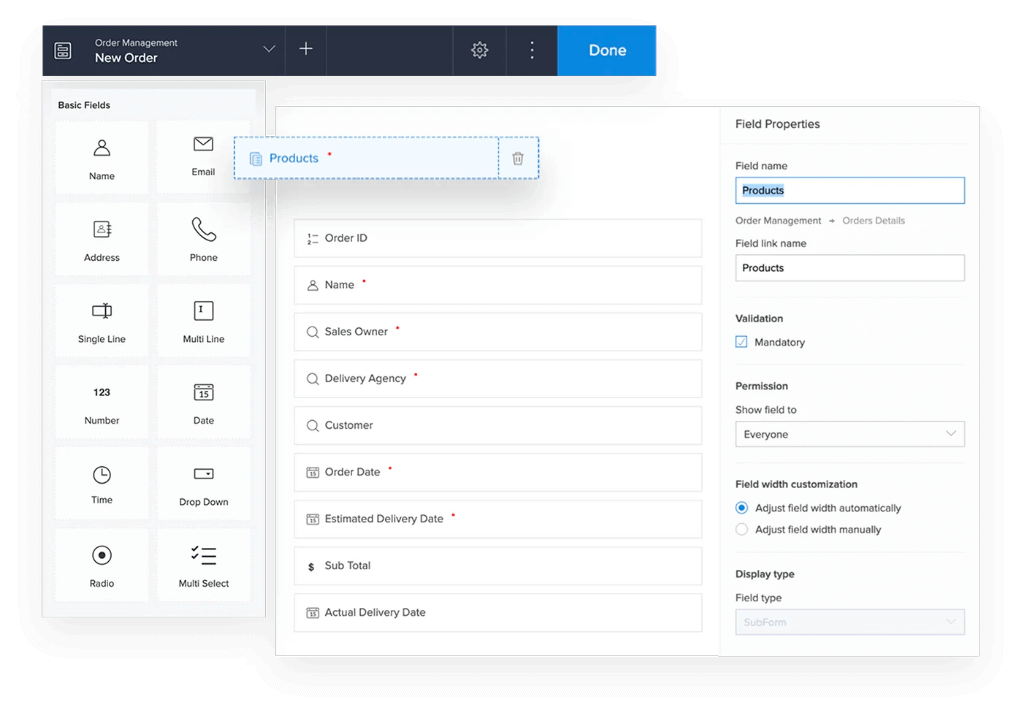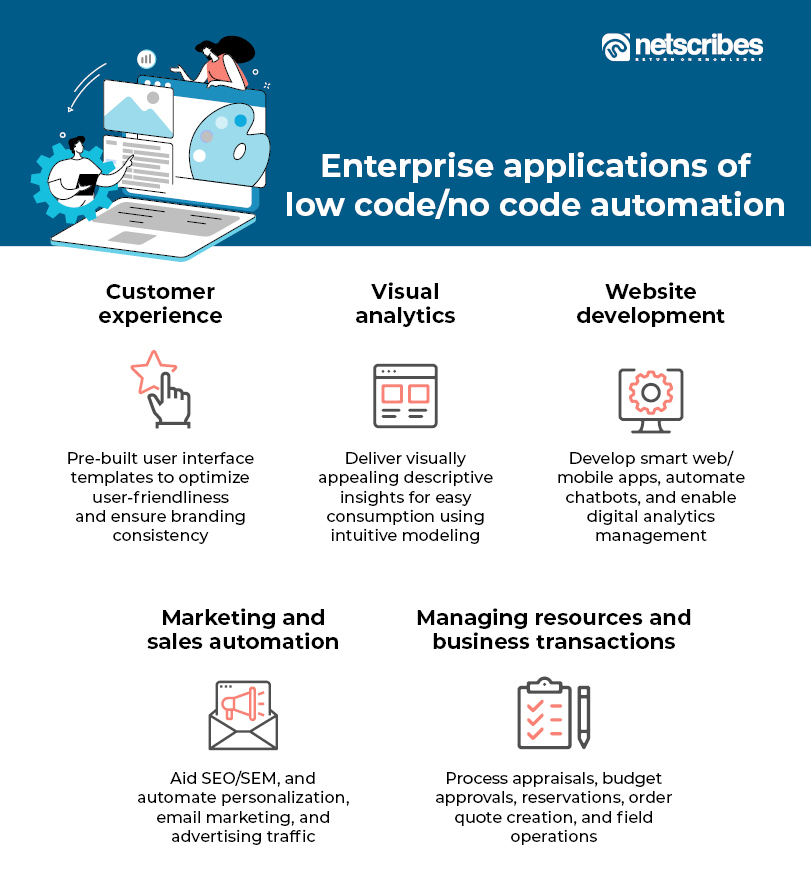Recommended Facts For Deciding On Low-code platforms for application development
Recommended Facts For Deciding On Low-code platforms for application development
Blog Article
In Terms Of Integration Capabilities, Low-Code Application Development Has A Lot Of Advantages.
Low-code application development offers significant advantages in terms of integration capabilities. These are vital for developing applications that are able to seamlessly connect to various platforms and services. These are the main advantages: Pre-built connectors and APIs:
A Wide Range of Connectors: Low-code platforms typically come with a vast library of pre-built connectors to common enterprise systems (e.g. ERP CRM, databases, as well as cloud-based services). The process of integration is simplified.
API Integration: Many platforms offer out-of-the box API integration capabilities. This lets developers quickly connect to external data and services.
User-Friendliness:
Drag-and-Drop Integration: Many integration tasks are completed by using drag-and-drop interfaces. This allows developers and nondevelopers to create complicated integrations with minimal or no programming.
Visual Workflow Builders: Tools to create workflows and data flows that visually represent help understand and set up integrations in a simpler way.
Standardized Integration Methods:
SOAP/RESTful Service Support: Web services that use standard protocols, such as SOAP/REST, facilitate the integration of a range of external applications and systems.
OData and other Standards: Support for standards such as OData provides easy access to and manipulation of data across a variety of platforms and software.
Real-Time Data Synchronization:
Real-Time Integrations: Lowcode platforms can handle data synchronization in real-time between the system and applications to ensure that data is current and consistent across the organization.
Event-Driven Architect: A few platforms are equipped with structures that are event driven, allowing applications to respond immediately to events. This is essential in dynamic interactive applications.
Legacy System Integration:
Connecting Old Systems and new Systems Low-code platforms typically provide tools to integrate with existing old systems. This allows companies to modernize their IT Infrastructure without overhauling the current systems.
Data Migration Tools Built-in data migration tools allow you to transfer data from older systems to lower-code applications.
Integration of Third-Party Services:
Integration with Cloud Services: Seamless integration with cloud services such as AWS, Azure, and Google Cloud allows for the simple deployment and scaling of applications.
Business Applications Low-code platforms can be used to connect with a variety of business apps like Salesforce, SAP or Microsoft Dynamics. They enable the creation of a seamless workflow for all business functions.
Data management simplified:
Unified Data Models A few low-code platforms provide unification of data models, which simplify the management of data and integrate across different platforms.
Data Connectors Pre-configured data connectors allow you to easily access and manipulate data from a variety of sources.
Security and Compliance
Low-code integration platforms adhere to security standards to safeguard the data during transport or in rest.
Compliance Features - These platforms include features to ensure the integrations are compliant with regulatory requirements.
Extensibility:
Custom Codes and Scripts. For more complicated requirements for integration, low-code platforms typically allows for the integration of custom scripts and code. This allows flexibility without compromising user convenience.
Plug-in Ecosystem An ecosystem of extensions and plugins can further extend the integration capabilities that allow users to include additional functions as they need.
Overall, integration capabilities within low-code development platforms enable them to function as a strong platform for developing integrated efficient, scalable and connected applications. They make it easier to connecting disparate systems, enhance data flow and allow companies to take advantage of new technologies while leveraging existing ones. See the recommended Low-code Platform for application development examples for more examples including app modernisation, app development platform, rapid app development, develop cross platform mobile app, application development platforms, app dev platform, rad development, low code platforms, app platforms, ms azure sql and more.
Advantages Of Low-Code Application Development In Terms Of Governance And Security
Low-code applications offer several benefits in terms of cybersecurity and governance and cybersecurity, which is essential to ensure that all applications are well-managed, managed and in compliance throughout their livescycle. Here are a few of the most important advantages:
Unified management console: Low code platforms usually provide a central administration console from which administrators are able to manage all the applications and maintain a consistent governance within the organization.
Role-Based Access Control RBAC: These platforms are equipped with robust role-based controls that allow administrators to establish access policies. This permits only authorized users to modify or access certain parts of a program.
Compliance and Regulatory Adherence
A lot of low-code platforms have integrated compliance features. For instance, they are built in line with the standards of the industry, regulations and laws (e.g. HIPAA, GDPR). They offer tools and frameworks which help ensure that applications meet these requirements.
Audit trails and logs Audit trails that are comprehensive and logging can be connected. This lets organizations monitor and track access and changes, as well as to ensure the compliance of internal policies as well as external regulations.
Additional Security Measures
Data encryption. Low code platforms usually offer built-in encrypted data when in transit as well as during rest. This protects sensitive information.
Security Certifications - A lot of lowcode providers have security certifications such as ISO 27001 (or SOC2) that demonstrate their adherence to high security standards. Users can be assured that these providers adhere to these standards.
Automated security updates
Regular Updates and Patches Low-code platforms typically are capable of handling patches and security updates regularly. This ensures that applications remain safe from the latest threats, without developers having to manually intervene.
Security Monitoring: Continuous monitoring of security tools are typically provided, providing real-time alerts as well as insights into security concerns that could be a problem.
Data Governance:
Data Access Policies: These systems enable organizations to define and enforce policies on data access, ensuring that data access is restricted only to those who have been granted access and utilized in a proper manner.
Data Masking and Anonymization: Inbuilt tools for masking data and anonymization help protect sensitive information, especially in development and testing environments.
Consistent Lifecycle Management of Applications
Pipelines for Deployment and Development: Low-code platforms often provide integrated deployment and development pipelines that include security checks to ensure that security remains intact throughout the application lifecycle.
Version Control - Integrated version controls helps track changes to applications and allows the application to be reversed in the event of need. They also ensure the integrity and performance of the application.
User authentication:
Single Sign-On (SSO). Support for advanced authentication and single sign-on makes it easier and improves security.
Multi-Factor Authentication A lot of platforms come with built-in support of multi-factor authentication. This adds an extra layer of security to applications.
Policy Enforcement and Compliance:
Low-code platforms usually come pre-defined with policy templates to assist organizations in implementing governance and security policies quickly.
Tools for Compliance Monitoring: These tools monitor and provide continuous reports on the status of compliance. They help to find issues and deal with the issues in a proactive way.
Integration with Existing Security Infrastructure
Integration seamless: Low-code platforms can be easily integrated with existing security tools and devices like firewalls, SIEM products (Security Information and Event Management), and identity management systems.
API Security: API integrated security ensures integrations with external systems are secure. Protect data and maintain the application's consistency.
Training and the best practices
A lot of platforms provide guidelines and best practice for secure application development. They can help developers who are not developers to adhere to security standards.
Security Training Some low code providers offer security tools and training for users to educate them on how to maintain and build secure applications.
Overall, low-code application developers provide a governance and a security advantage that allows them to build and manage their apps in a controlled, regulated and secure manner. These platforms offer all the tools and frameworks needed to protect sensitive data and enforce policies, while ensuring regulatory compliance. Follow the best find about Legacy application modernization with Low-code for site recommendations including low code development platforms, low code development platforms, cloud software applications, app modernisation, mobile app development platforms, cross platform app dev, app modernisation, rapid applications, software for app development, azure sql databases and more.
Community And Support From The Vendor Are Two Of The Advantages Of Low Code Application Development.
Low-code platform development has many advantages, such as support from the vendor and community support. This is crucial to ensuring successful application implementation, ongoing maintenance and continuous improvement. These are the main advantages: Support from vendors
Comprehensive Technical Support:
Support Teams with Dedicated Support Numerous low-code platforms provide dedicated support teams who can help with technical issues, problem solving and advice. This ensures that any issues are swiftly resolved.
Certain vendors provide 24/7 support. This is especially beneficial for multinational companies that have various time zones.
Training and Onboarding
Vendors will often offer structured programs for users, such as tutorials and webinars. They may also provide certification courses.
Personalized Onboarding Many vendors offer individualized services to assist their new customers get onboard effectively and customize it to their requirements.
Regular Updates, Enhancements, and Enhancements:
Continuous Improvement: Low-code platform vendors generally release periodic updates which include new features, performance enhancements and security patches ensuring that the platform stays cutting-edge and secure.
Feedback Integration: Vendors typically incorporate user feedback into their development cycles, ensuring that their platform is constantly evolving to meet the changing requirements of their users.
Comprehensive Documentation:
Detailled Documentation: Comprehensive and well-organized documents are usually available that covers everything from basics to advanced customization, which assists users in finding solutions independently.
API References API documentation provides specific API references to assist developers connect their low-code platform apps with other systems.
Consulting and Professional Services
Expert Consulting: Vendors typically offer consulting services to assist in the process of strategic planning as well as design of architecture and complex implementations to ensure that users have the ability to leverage the platform to its maximum potential.
Custom Development Services: Certain companies will provide custom development services to create functions or integrates for their clients that are not easily available.
Community Support for the Community
Active User Communities
Forums and discussion boards Forums and discussion boards: A lot of low code platforms have active online communities where users can discuss issues, share solutions and collaborate on best practice.
User Groups and Meetings: Local and virtual meetings and groups of users give you the chance to study, network, and share experiences with others.
Collaboration and knowledge sharing:
Community-Contributed Resources: Users often share templates, modules, and extensions that they have developed, which can be reused or adapted by others, accelerating development and innovation.
Crowdsourced Problem-Solving: The collective expertise and experience of a group can be a valuable source to solve problems and discover creative solutions to complicated problems.
Learning and Development
Community-led training: Many community groups offer workshops, webinars, and workshops led by professionals who are experienced in the area.
Online Tutorials and Courses The community members develop and provide tutorials, online classes and guides on how to use. This enhances the learning resources that are available to users.
Feedback and Influence:
Product Feedback Channels. Forums for community members usually have channels where you can provide feedback to the manufacturer. This feedback may influence the design and development of new features.
Beta Testing: Members of active communities could be able to participate. This gives them early access and be involved in the design of the platform.
Recognition and Support
Community Recognition Programs - A lot of vendors have recognition programs that recognize the contribution of the active members of their communities, including MVP (Most Valuable Professionals) programs.
Peer Support: Members of the community often provide peer support, sharing their expertise and providing guidance to users who are not as familiar, fostering a collaborative and supportive environment.
The overall result of robust vendor and active, engaged communities provide a comprehensive environment for support for low-code application development. Users will be able gain access to the experts, resources and collaboration opportunities they need in order to successfully build, deploy, maintain and further enhance their apps.